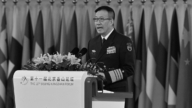【新唐人2011年11月28日訊】中國富豪黃怒波在冰島的購地計劃于11月26號畫上句號,冰島內務部長態度強硬的拒絕了他的購地申請。一直對冰島買地項目充滿樂觀的黃怒波,感覺不可思議。因為,從2007年到他申請時,冰島政府共受理了25起外國人的購地申請,其中僅一起被拒絕。那麼,是甚麼原因使黃怒波的計劃成為泡影了呢?我們來聽學者的分析。
高原、火山岩和野草,還有呼嘯的風,這塊位於冰島東北部,300平方公里的荒涼之地,黃怒波打算砸下9000萬美元購買。他還計劃要投入1億美元甚至更多資金,在這裏修建一座豪華酒店和高爾夫球場,開發旅遊業。
不過,26號,冰島內務部長約納松正式表態拒絕了黃怒波提出的購地申請。冰島內務部的一份聲明說,沒有外國買家購買如此大面積土地的先例。
約納松以強硬的口氣說:這是最終決定,再無變更餘地。
經濟學者草庵居士分析,經過這麼多年的開發,冰島旅遊業基本上已經飽和。而黃怒波購買的土地佔了冰島整個國土的0.3%,冰島政府由此產生警覺。
經濟學者草庵居士:「這種大面積的開發旅遊業,從某種意義上來講,評估,對投資上來講是荒唐可笑的,但是我們要注意他的背景,黃先生曾經是中宣部幹部、官員。有很多新聞界的專業人士講,中國政府在旅遊業的名義在當地將建立一個軍事基地,所以在這種情況,當地政府國家拒絕購買完全是出於一種對中國的警覺。」
今年8月底黃怒波提出購地申請就受到質疑。英國《金融時報》早前報導,黃怒波曾經在中共中央宣傳部和中國建設部工作過的背景,讓人擔憂「北京可能會獲得在北大西洋的戰略立足點」。
對於外界猜測自己代表政府圈地,黃怒波發表聲明說,他的計劃「與政治企圖毫無關聯」。黃怒波辯解,中國上世紀八九十年代,政府官員「下海經商」是熱潮。
黃怒波起家於房地產市場。根據《福布斯》(Forbes)的排名,他擁有8.9億美元的淨資產,在中國富豪榜上排在161位。
《中國事務》主編伍凡認為,黃怒波投資買地背後的後臺老闆是中共政權,是中共當局一個戰略投資。
伍凡分析,冰島的北邊的北極,由於天氣暖化,冰塊溶解,航路在夏天可以打開,將會降低出口運輸費用。除了這個航路的利益,另外一個更大的利益是北極的能源。
《中國事務》主編伍凡:「中國如果在靠近北極的地方,冰島有一塊地,那就等於屬於你的『飛地』了,『飛地』就是說我在外國有一個領土,『飛地』慢慢發展,那就很難預料了。那些戰略專家們都在分析,這樣做對西方不利,對美國不利,對冰島也不見得有利。」
英國《金融時報》分析,不管出於甚麼動機,這筆交易都突顯出,中國和中國企業家正日益著眼於在海外施展財力。報導指出,中國投資者正在全球各地大肆購買土地和資源。
經濟學者草庵居士:「對中國的警覺的根本原因是中國是一個獨裁的國家,不是一個民主制度國家,如果是一個民主制度國家是不會遭遇這些問題的。所以我們在整個問題上看,根本的是中國要解決的是制度問題。這是一個根本的問題,而不是在全世界用謊言來欺騙全世界。」
路透社引述布魯塞爾自由大學當代中國研究所所長霍爾斯拉格分析說,黃怒波的專案也許是民間行為,但確實符合中共政府在海外收購土地等戰略資產的政策方針。
新唐人記者劉惠、李靜、葛雷採訪報導。
Iceland Turns down Chinese Tycoon
Chinese tycoon Huang Nubo’s plan to buy land in Iceland
finally came to an end on November 26th
when Iceland’s tough-talking interior minister rejected
his application to purchase land.
Huang Nubo was astonished by this decision,
for he was fully optimistic about the purchase.
Since 2007 until his application, the Iceland government
has taken 25 foreigners’ land purchase applications and ejected one only.
What, then, was the reason for this rejection?
The experts share their analyses.
Plateau, volcanic rocks and weeds, as well as the roaring wind,
this 300 square kilometers of barren land located in the northeast of Iceland is where Huang Nubo had planned
to buy for a price of US $90 million.
He also intended to invest US$100 million or more into
building a luxurious hotel and golf course for tourism.
However, on the 26th, the Icelandic Interior Minister Jonasson
formally rejected Huang Nubo’s land purchase application.
Icelandic Ministry of the Interior said in a statement that
there’s no precedent example of any foreign buyers to purchase a piece of land on such a large scale.
Friday’s decision is final and cannot be appealed,
the minister said.
Economists Caoang analyzed that after so many years of
development, the Icelandic tourism industry has basically been saturated.
Huang Nubo’s land purchase would account for 3% of all of
Iceland, which is alarming to the Icelandic government.
Economist Caoang: “A tourism development on such a
large scale, in terms of investment, is ludicrous, and
we should pay attention to his background, Mr. Huang was
once a cadre in Propaganda department, and an official.
Many media professionals have said that the Chinese
government will establish a military base in the name of the local tourism industry,
so in this case, the local government refusing the purchase is
completely out of being on alert."
Huang Nubo’s intention was once questioned when he
proposed his land purchase application at the end of August.
Huang Nubo’s work history in the Communist regime’s
Central Propaganda Department and
the Chinese Ministry of Construction caused concern: “Beijing
is trying to get a strategic foothold in the North Atlantic."
In response to the speculation that his land purchase is
on behalf of the Communist regime,
Huang Nubo issued a statement and claimed that
his plan has no relation to any political intent.
He explained that since the eighties and the nineties of
last century, Chinese government officials going into business has been a trend.
Huang Nubo established his fame in the real estate market.
According to Forbes rankings, he possesses US $890 million
of net assets and is ranked 161 on the China Rich List.
“China’s affairs" editor Wu Fan believes that Huang Nubo’s
investment to buy land was supported by the Chinese Communist regime,
and a strategic investment of the Chinese authorities.
Wu Fan analyzed that the ice in the Arctic of north Iceland,
due to the weather warming, would dissolve, and the routes could be opened in the summer,
which would in turn reduce the export transportation costs.
In addition to this transportation interest, another benefit is the greater Arctic energy.
“China’s affairs" editor Wu Fan; “If China owns a piece of
land near the North Pole in Iceland, it is equal to owning an ‘enclave’, and ‘enclave’ is a territory outside the state;
With ‘enclaves’ development, it is difficult to predict.
The strategic analysts believe this would be a disadvantage to
the West, against the interest of the United States, and not necessarily beneficial to Iceland. “
British “Financial Times" analyzed, “whatever his motives,
the deal shows how China and
its entrepreneurs are increasingly looking to exercise
their growing financial muscle abroad."
The report indicated, “Chinese investors are buying up land
and resources around the world."
Economist Caoang: “The root cause of this alert of China is
because China is an authoritarian state, not a democratic country.
A democracy will not encounter these problems.
Therefore, the whole issue is for China to solve the system
problem, which is a fundamental problem, rather than lying to deceive the world. “
Brussels Institute of Contemporary China Research Director
Hall Slager said: “This investment project in Iceland may be civil behavior,
but it does meet the overseas acquisition of land, raw materials
and technology policy and other strategic assets."
NTD reporters LIU Hui, Li Jing and Gei Lei




























